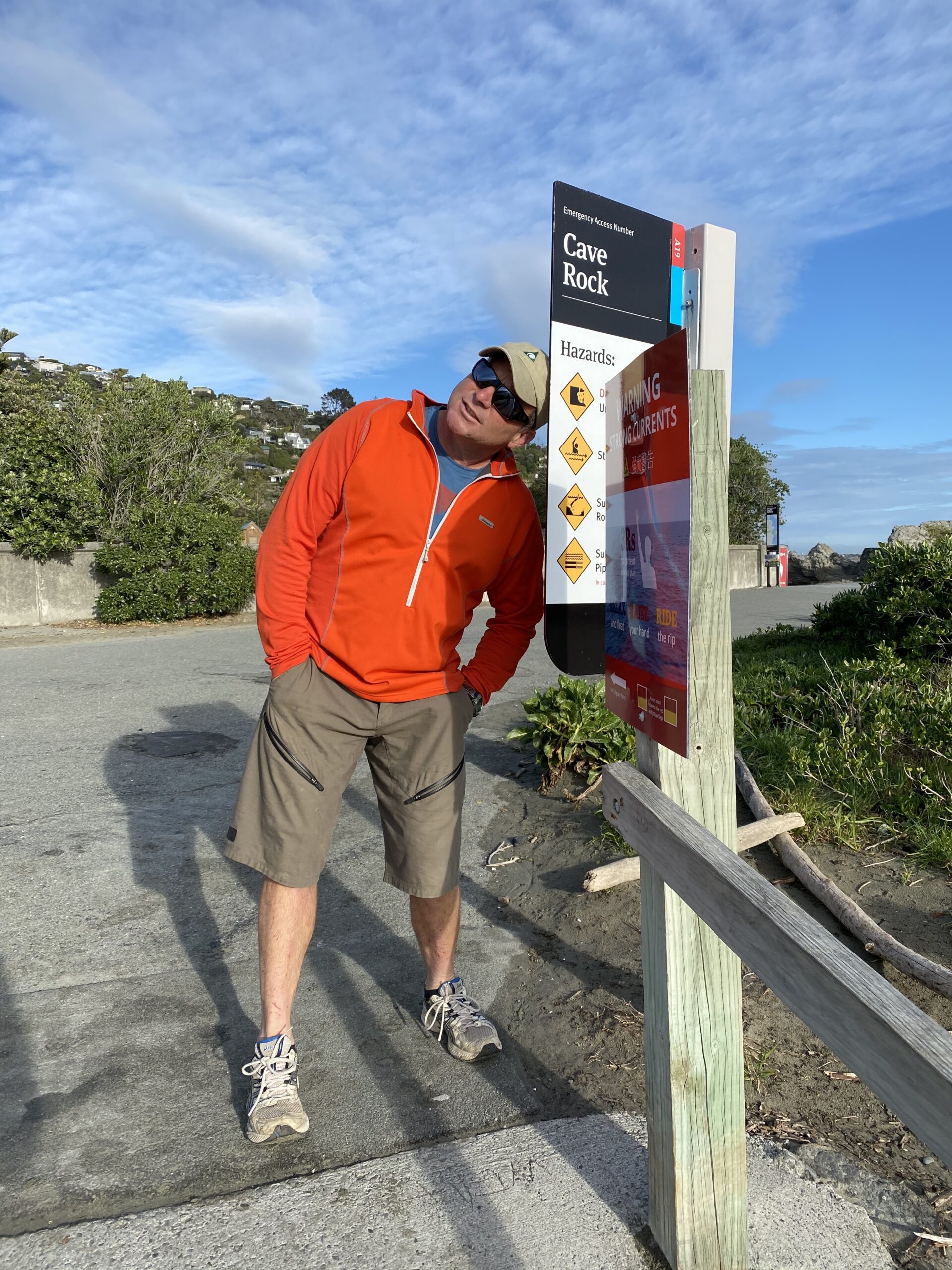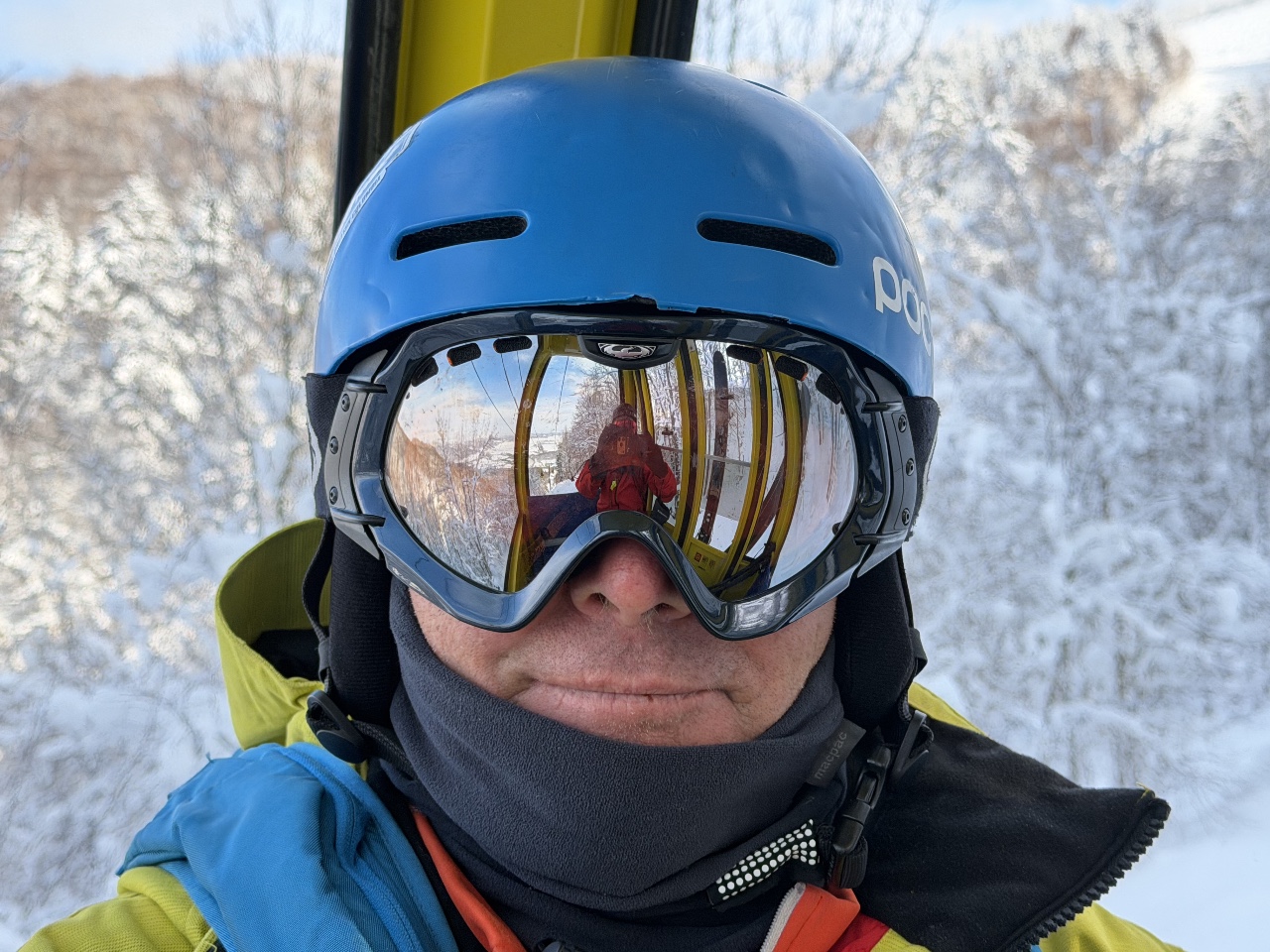Chris contemplating the hazards of Cave Rock, Sumner Beach, Christchurch.
The hazards at Cave Rock are mainly people – people want to stand under cliffs that are raining rocks upon them, people want to wave to other people while moving rapidly sideways in the water instead of just relaxing for the ride, people want to dive into the water without checking if there are rocks underneath the surface. I really don’t understand people!
Of the many things that I don’t understand, the vast majority relate to human nature. I have questions like, why don’t people act in their own best interests? That’s a rather big question, let’s step in down a level.
Why do people want to go on aeroplane flights to nowhere? There is, apparently, a growing market for people to buy aeroplane flights that take off and land in the same place but offer scenery and a luxury experience in between take off and landing. Now, we know that aeroplanes have a significant role in climate change. It is hard to deny people the right to move between countries easily when there isn’t a pandemic. However, wouldn’t the world be best served by people not flying at all if they can’t fly to a distant destination?
The problem we have is that the profit motive says, “I have a bunch of aeroplanes I can’t use, and trained staff that I can’t pay, so I had best figure out some way of getting a return on them before my company goes broke”. Enter flights to nowhere. Air Taiwan was apparently one of the first, with All Nipon in behind and Qantas hot on their heels. Singapore Air is apparently contemplating the concept, and packaging it with a hotel stay associated with your flight – you can have a holiday without ever leaving town.
Why do people want to invest in gold, as a mineral that has little relative utility but costs a lot to mine? Our investment advisor sends out a weekly newsletter. In the most recent one he talked about his investment in a small gold exploration operation in Central Otago (Bendigo-Ophir project), that has recently sold out to an Australian gold explorer (Santana). The proposed margins for gold from the mining are so good as to not pass my “Really?” test, particularly given my jaded nature in regard to mineral exploration after working in it around the world.
Call me naive, but I was truly shocked when I realised the exploration work we were undertaking in Vietnam was never going to result in any meaningful resource. We were looking for coal bed methane, ostensibly to supply the Hanoi region with an energy source that they desperately need. In actuality, however, it was quite clear to most involved in the project, that the geological conditions would preclude any gas ever being extracted. The entire project was an exercise in pass the parcel, with the ‘value’ of the resource escalating at every pass, and some investor/s eventually realising that there was nothing beyond the wrapping paper. It was simply an exercise to create wealth for some, and loss for others, disguised as humanitarian in nature.
The Bendigo-Ophir project may generate all the wonderful amounts of money projected, although I doubt it. And, in a COVID-world, what do we need? Do we need large quantities of gold that we don’t have much use for and will most likely hoard somewhere barricaded from theft? Not really! We might need large quantities of lithium or cobalt for electric car batteries, but that is a whole other area of debate. But this is what people want to invest in, because of their millenial emotional attachment to gold as a commodity that doesn’t deteriorate (and looks pretty).
The Bendigo-Ophir project certainly won’t generate large numbers of jobs, because mining doesn’t need large numbers of people any more, just expensive machines. An economist was expounding on National Radio in regard to how many jobs you get for your investment. If you invest in service industries e.g. health or old age care, you get roughly ten times as many jobs for your money as if you invest in infrastructure projects. He suggested that the current government approach comes out of the 1930s. That gave me lots of pause for thought, I hope our politicians heard it.
My last question for today is, why can’t our government see the link between COVID-19, the need for rapid evolution of behaviour and similar needs for rapid evolution in the face of planetary challenges related to climate change? COVID-19 is decimating a whole lot of types of business. How do we react? Apparently the done thing is to try to prop these businesses up so they can survive for when we get back to 2019, which we won’t unless someone comes up with a time machine. I find myself sympathising with National promising tax cuts, so the population can spend their own many where they choose – letting the businesses that people don’t want any more fail on their own and the necessary business evolution occur. Too bad for National that much of the COVID money has already been spent so, even if this policy might make sense, they won’t be able to do it without ratcheting up the debt levels.

So here is a situation in which rapid adaptation is required, and we are finding it really hard. We don’t want to lose things that we previously had – loss aversion is a built-in human quality. We are in a frog boiling situation (where the water temperature continues to gradually increase until the frog dies, because it only senses incremental change so doesn’t notice the problem). When we started lockdowns there was a promise of a vaccine this year, international travel by early next year and normality didn’t seem too far away. Has anyone noticed that both a vaccine and international travel remain about the same length of time away as they were in March, but we have moved on 6 months? This creep isn’t something the politicians or media is highlighting (though the orange-haired creep is adamant that the USA will have a vaccine pretty much net week).
Is there any way we can collectively learn from the COVID-19 experience to drive the action we need to happen if we want to stick around on this planet?


Discover more from Jane Shearer
Subscribe to get the latest posts sent to your email.




